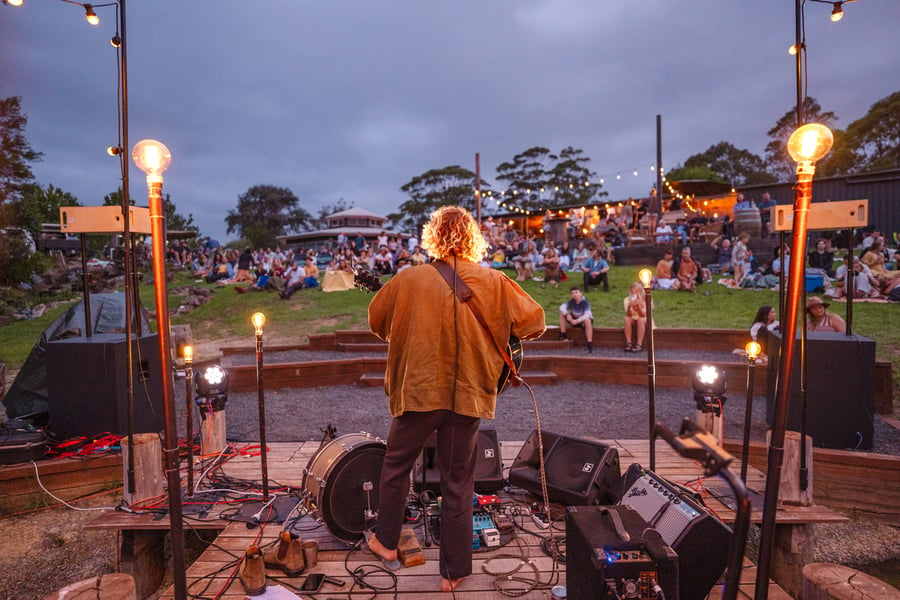Fires, floods, cyclones, droughts, eradication, extinction, death, destruction. Extreme weather events and their increasingly severe consequences are here, and the science says they’re only going to get worse.
From Coldplay’s use of kinetic energy dancefloors and energy-storing stationary bikes on their current tour, to Massive Attack’s festival powered by renewable energy, artists are putting sustainability at the forefront, including many Australian musicians intent on taking their eco-friendly message to the masses.
Think of a song that’s changed your mind. Opened your eyes. Ignited a fire. Let loose a flood of emotions and ideas.
Now think of an instance when you heard it. Chances are, you’ll have at least one vivid memory of the music or lyrics engulfing you and the surrounding environment. It could have been around a campfire. At a wet (and wild) festival. Sitting on a clifftop, mountaintop or rooftop. Or even just staring out the window on a bus.
Whether it was banal or beautiful, songs — and our experiences with them — become intrinsically linked to the environment we’re in, the nature we’re surrounded by and the land we’re on.
As the climate crisis intensifies then, it’s little surprise that musicians are well placed to deliver some powerful messages about what we’re doing to the planet, and that they’re making a lot of noise about what to do next.
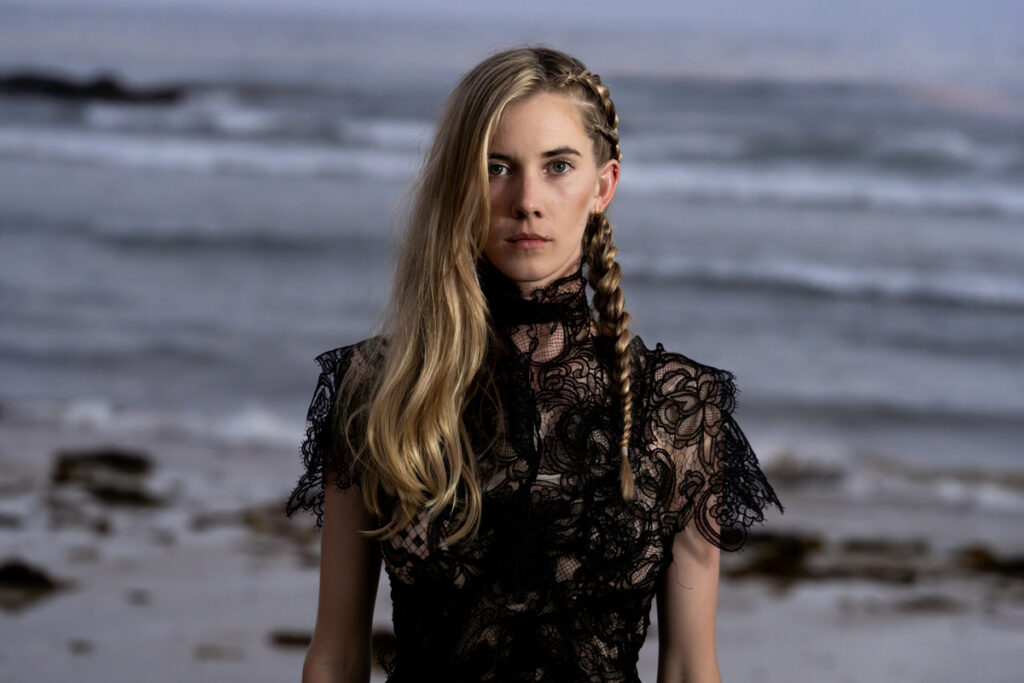
Woodes.
My Rugged Home
Aussie musician Elle Graham, who performs as Woodes, has always had an intense and inseparable connection to the natural environment around her. She’s the child of a marine biologist and park ranger, and grew up in a National Park in North Queensland.
Love Music?
Get your daily dose of everything happening in Australian/New Zealand music and globally.
She can’t separate herself or her music from the natural world, and there’s an immense pride in being connected to Australia’s unique flora and fauna, which is only amplified when she’s splitting her time between Australia and the US.
“It’s so cool to see what Australia is to the rest of the world, and I think we have a really beautiful relationship with the rugged, and it’s almost like you can spot an Australian overseas. There’s this really beautiful connection with nature and wildlife, and just sort of weathering it, and the tough energy, and it makes me really proud and really protective of this beautiful country,” she tells Rolling Stone AU/NZ.
Oli Leimbach from Lime Cordiale believes this international vision of ourselves, combined with the devastating 2019 bushfires, has compelled people to stop and think about what might be at risk should environmental degradation continue.
“The bushfires were a big awakening for a lot of people,” he says. “Post bushfires, more people are aware of how much they actually love the environment. Every Australian, especially when they’re overseas, is boasting about Australian landscapes and our flora and fauna and our dangerous spiders and all these things. And it would be pretty devastating to see these things change.”
Melbourne-raised Sheona Urquhart Smångs is also acutely aware of how the bushfires changed both our views of our natural environment and how our environmental management and disasters are perceived overseas.
The musician, former Neighbours guest star, and previous employee of the Country Fire Authority (CFA) in Victoria was in Sweden when the 2019 bushfires ravaged her beloved home country.
“People were freaking out over here, so it felt like I couldn’t really escape it from here either,” she says.
“Fire is a really humbling element because you’re very powerless to it, even when you’re fighting it. You don’t really fight fire, you just contain it and try to let it do its thing. So it makes you feel very powerless.
“I started getting this feeling of extraordinary powerlessness… I was just feeling incredibly sad, but then I felt incredibly disappointed in how our government was handling it. I felt incredibly disappointed. Really pissed off. And so it was a combination of feeling incredibly sad and feeling incredibly angry.”
She channelled this anger and frustration into a song, “My Rugged Home”, explaining why she felt music was the answer in a long-distance chat with Rolling Stone AU/NZ.
“You sing when simply speaking is not enough. You write a song when simply talking about it is not enough. You’re levelling up your thoughts in a way, in a message that hopefully can be conveyed. I think that’s why artists [lend their voice to these causes]. I think we’re compelled to,” she says.
“I think that’s what music does — what the arts does — is it helps articulate how we feel.”
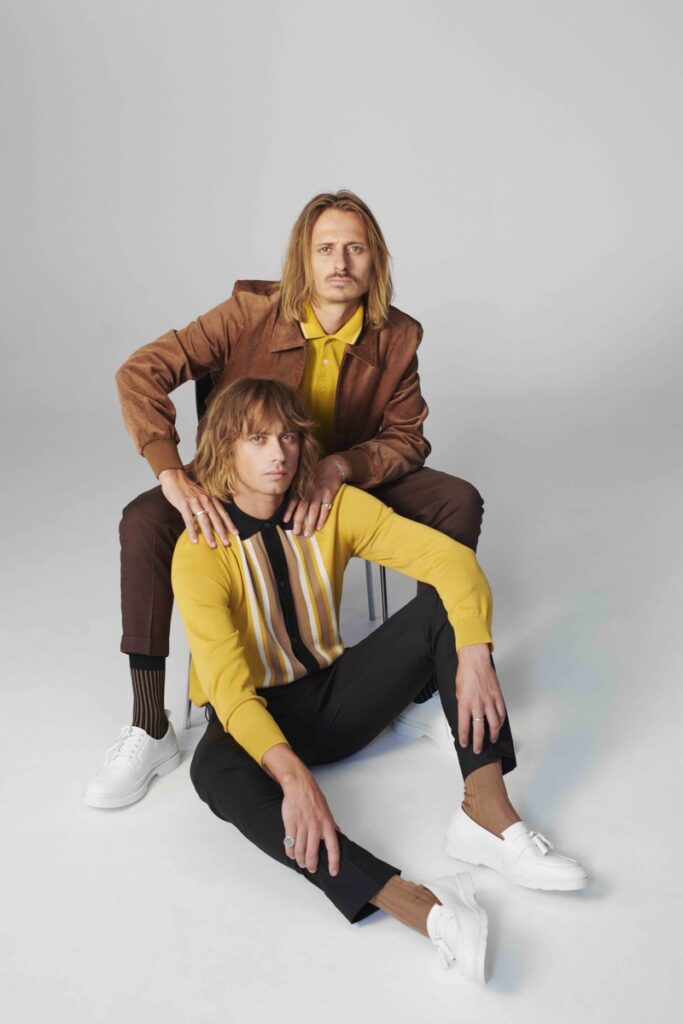
Lime Cordiale.
The Sound of Silence
One issue with speaking out about sustainability, can be people’s urge to point out the flaws or inconsistencies in what you are (and aren’t) doing. It can be a tricky balance of preaching to your fans, when you are still very much reliant on a broken system to survive.
Despite his environmental activism and deeply held beliefs, Lime Cordiale’s Leimbach is also realistic about the compounding pressures on musicians who are trying to make it and how many demands and competing agendas they’re already grappling with.
So he acknowledges that sometimes sustainability ends up taking a back seat. To those who have let their focus shift or who may have lost sight of the plight, he says they can always start again with small steps.
“We started off as environmentalists in the way that we grew up on the Northern Beaches [of Sydney] and as ocean lovers. We stopped eating seafood first, actually, because we couldn’t believe that we were taking fish out of the ocean, out of their natural habitat.”
From there, they did charity shows in their early days for Sea Shepherd and other local organisations in a bid to help protect and raise money for the ocean.
As the band grew though, and there was a need to make money, do more shows, and be everything to everyone, sustainability became harder to prioritise.
“It just felt way too overwhelming,” he says. “And then a few years ago, we sort of realised, like, ‘What the hell are we doing?’ We have this voice. And the reason we wanted this voice in the first place was to be role models of some sort and preach what we believed in.
“So then we came back to this sustainability work that we believed in and it transformed.”
This transformation is seen both in Lime Cordiale’s professional and personal lives.
Personally, they’ve become involved in regenerative farming, having purchased a farm just over three years ago.
“It’s sequestering carbon. It’s been a big learning curve for us, because there’s 70 head of cattle up here, and I always thought that cattle were bad for the environment and they trampled the earth, and I thought that maybe we were purchasing something bad. But the local farmers up here introduced us to regenerative farming and it’s all about soil quality. It’s all about bringing down the carbon from the atmosphere,” Leimbach says.
“So that’s been really cool — purchasing this traditionally farmed farm and being able to transform it into something that’s a lot healthier. We’re seeing the changes every year in terms of even just insects and the quality of the grass and soil.”
It is, as mentioned, a tricky balance.
“When we’re on the farm, we feel like we’re giving back to nature. And then when we’re off touring around Europe or America, we’re suddenly having this heavy carbon footprint again. So we felt like hypocrites,” he concedes.
This fear shouldn’t lead to inaction though, he says, because it’s better to do something than nothing.
“Transparency is really key. There are all these online warriors that will say, ‘Well you guys consider yourselves environmentalists, but how did you get to Melbourne? Did you drive? How did you get to Berlin? Did you sail?’ And they just want to rip into you,” he says.
“No, obviously we flew to Berlin, but I’m not telling you to not take a holiday… And maybe there is an argument for taking the show to people in a more carbon-friendly way [and spreading the message]…
“People can say whatever they want. As long as we’re all trying and working out alternatives, that’s what matters. Is it better to just give up and sit at home and not do anything?”
From Little Things, Big Things Grow
Graham has been able to create small actions and bring them into the ‘Woodes Universe’.
Every song on her 2023 EP Kingdom Come had an accompanying Australian hike which she shared with her audience. Her small team would go there to shoot an organic music video and “kind of just let it unfold however it happened without too much prep or set building or conceptualising,” she says.
“It was more about getting out and researching each location and wanting to bring my fans out into the wild with me,” she explains.
She also collaborated with Australia’s largest gardening club, The Diggers Club, doing an acoustic series of the EP and sending out wildflower seeds to fans who pre-saved the music.
“Being part of something like this, it makes you feel like just by being a fan and by being a part of a community that you’re doing good. A big thing that I keep coming back to as an artist is bringing joy and putting something positive out into the world, or just trying to give back this kind of euphoric belief that it can be better. That’s what I see as my role as an artist. A lot of the time, that’s what pulls me, that’s kind of like the North Star. That’s what I really value as a fan of music. And I think sustainability is just innately a part of who I’ve always been,” she says.
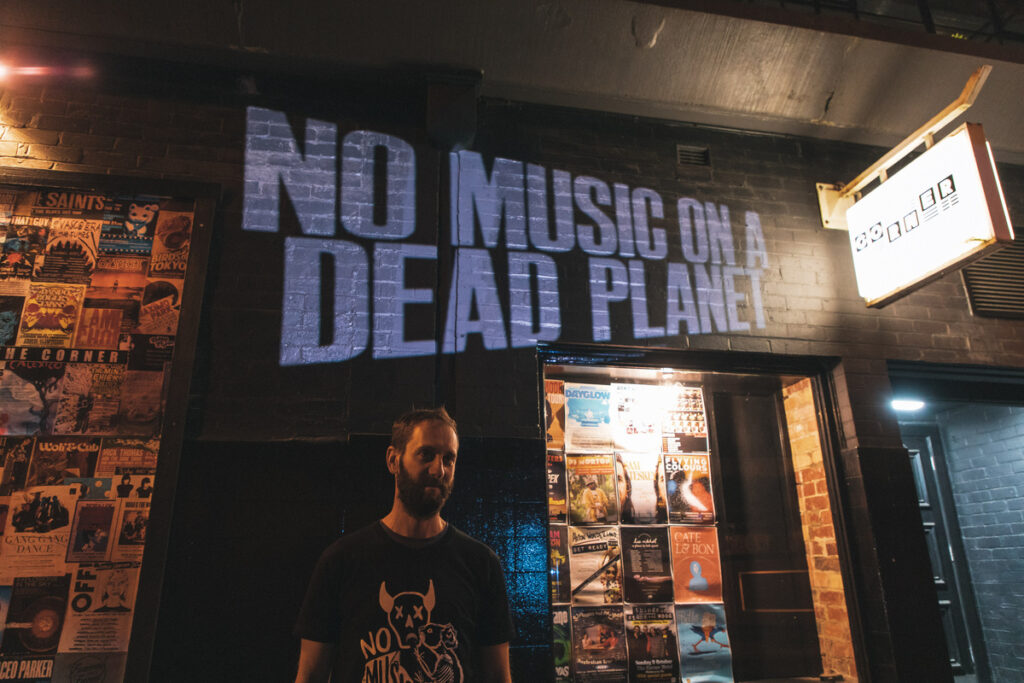
Green Music Australia CEO Berish Bilander.
Green Music Australia CEO Berish Bilander encourages both big and small actions from musicians.
“There’s magic in taking action, there’s magic in getting cracking and seeing a win on the board,” he says of getting started.
Indeed, Green Music Australia’s BYO Bottle campaign was picked up by hundreds of local artists, and then went further with the likes of P!nk, Dave Matthews Band, Jack Johnson and venues around the world jumping on board.
“On the flip side, we’re really careful to say to artists ‘Don’t stop there. Don’t just think that it’s all about the small actions’,” he adds.
“One of the most important things you can do is to talk about the climate crisis. Talk about how you’re trying to reckon your actions with the significant challenge that we all face. Talk about feelings of hypocrisy. Artists like Radiohead have really eloquently talked about the fact that their touring footprint is quite large and at the same time, they’re calling on governments to do more on climate. And there’s a level of hypocrisy there, but that doesn’t mean that they’re gonna stop, because it’s impossible for us to be perfect in a society that is so extractive.
“And so we really make the case that artists need to use their cultural power to talk to audiences and to call for bigger political action because politicians hold the huge economic levers, not artists.”
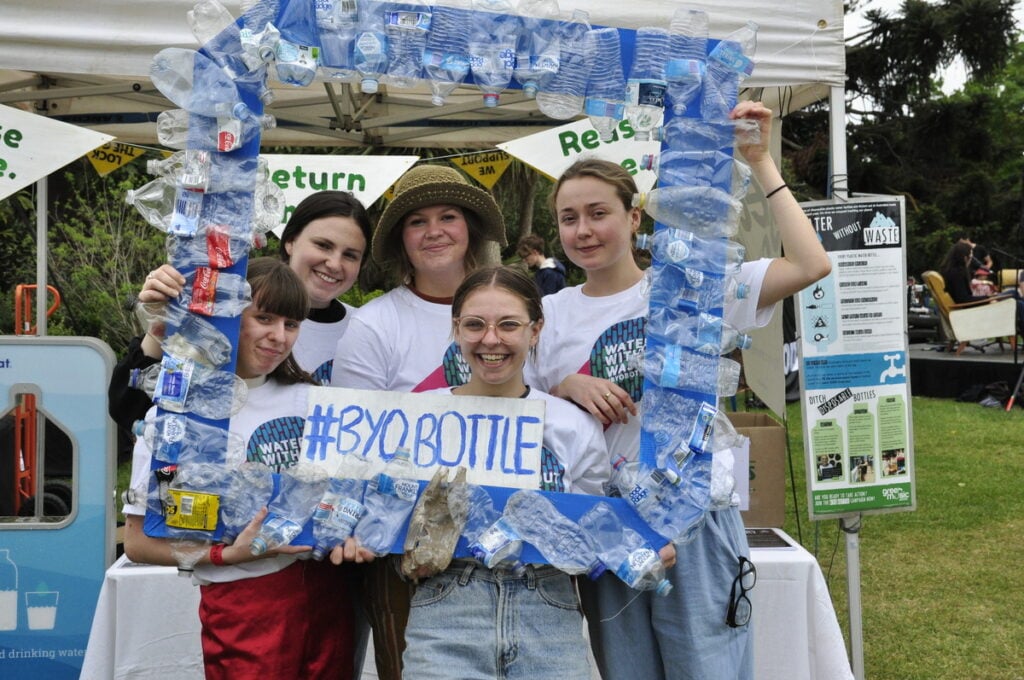
Green Music Australia BYO Bottle event.
There are also a lot of big and small actions taking place behind the scenes when it comes to touring.
A few years ago, musician Kim Churchill and his friend were inspired to build a stage which slides out the side of his campervan. He says it was liberating because it meant he was no longer beholden to venues and would be able to perform in more beautiful outdoor settings. He became frustrated, however, by the difficulties in fully powering this venture via solar and having to rely on fossil fuels and generators for certain aspects of performing.
Enter Alex Pinte.
Pinte founded Wildlive, which specialises in developing audio and lighting solutions which are low consumption and powered by renewable energies. He worked with a French startup, Pikip Solar Speakers, which developed a sound system which uses up to ten times less energy than a traditional setup.

Solar Sessions founder Alex Pinte.
He’s now doing the same work with the lighting required for touring musicians to create something which is low consumption or completely off-grid.
Pinte knows he has the solution, but he just needs to prove it to people.
So, he launched Solar Sessions, a proof of concept which will show it’s possible to do a sustainable, solar-powered music event. Solar Sessions looks at everything from sound tech to staging as well as waste, transport and food, working closely with the venues.
The concept also aims to overcome audience perceptions that they are always being asked to offset their impact, change their behaviour and fix the problem on their own.
“I could see artists asking the crowd to make an effort, you know, ‘Bring your own bottle’, ‘Watch your waste’. And I was like ‘We’re pushing the crowd, but what are we doing at our end to make things work?’ I thought it was too easy to put the problem on the audience. As soon as we put too much pressure on people, there’s a bit of a rejection,” Pinte says.
“So that’s part of my approach. I just want to make it easy and not put pressure on people.”
Churchill was part of Solar Sessions’ first series of gigs in December 2023 held on the NSW South Coast and says it’s an important step in the environmental sustainability of his career.
“It does really feel good to have at least improved as an artist. Being a touring artist is not an incredibly environmentally sustainable way to live, realistically. So, to have improved, it’s a nice feeling and helps me sleep at night,” he says.
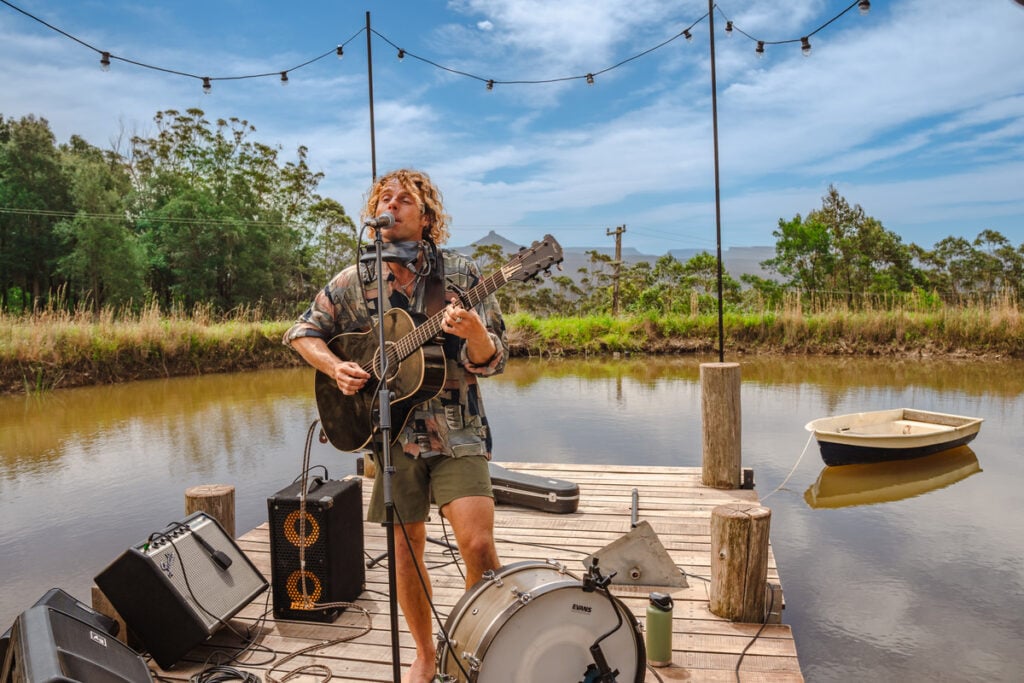
Kim Churchill playing Solar Sessions.
No Music on a Dead Planet
Aside from their moral imperative to act, musicians have also felt the real-world impact of changing climate conditions and extreme weather events.
“They have been directly affected by over 40 festival closures in the last three years alone,” says Green Music Australia’s Bilander. “We’re talking about a variety of extreme weather events from flooding to fires and high winds that are knocking out festivals left, right and centre. So they’re actually experiencing it in terms of their career.”
The reality is, Berish emphasises, there won’t be music on a dead planet. There won’t be musicians on a dead planet. There won’t be — well, anything — on a dead planet, and that’s a message and a mission strong enough to bring people together.
“We’re looking for a community of artists working in tandem, amplifying each other’s voices and that of the broader environmental movement to have substantive changes on issues like plastic pollution, emissions reduction and the government’s role in that,” he says.
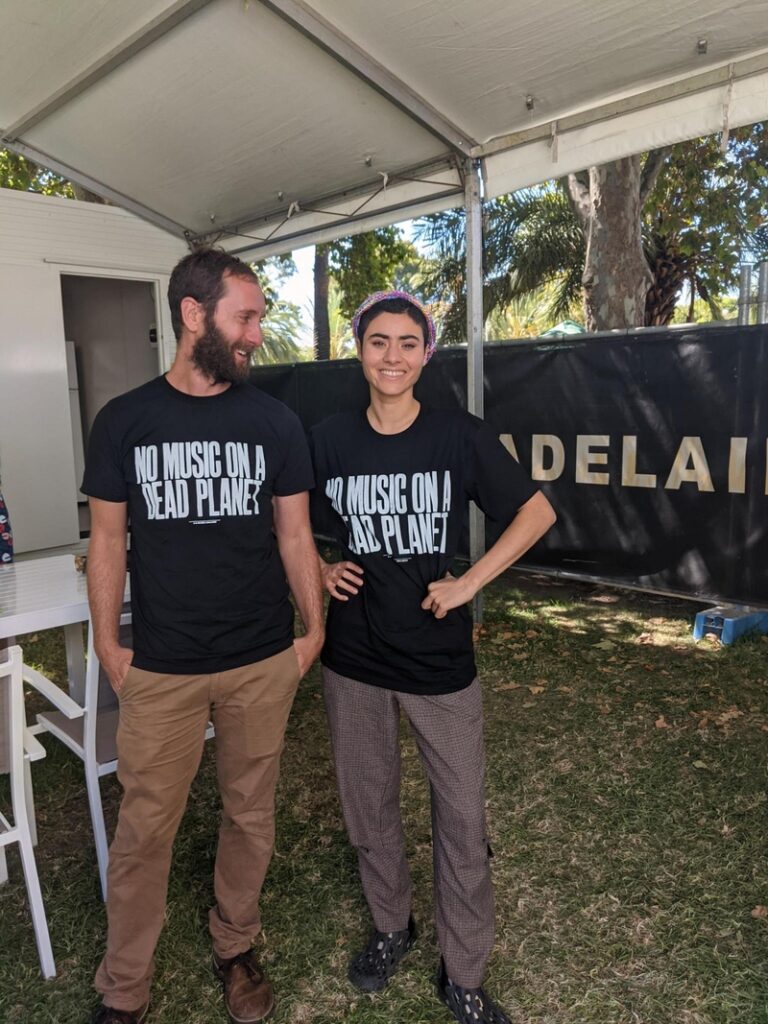
Green Music Australia CEO Berish Bilander and musician Montaigne.
Musicians are the perfect people to deliver this message, according to Edwina Floch, the founder of the Environmental Music Prize.
“The latest Climate Compass data revealed that a majority of Australians are climate alarmed, alert or concerned. Some of us are very active and informed. A lot of us sit in that kind of ‘Silent Middle’ where we aren’t really sure what to do. And so we really are at this tipping point where we need to create a massive cultural response, because we have the science, we have the solution, but we need to just be propelled into action and often it’s emotion that makes us take that final step or change our behaviour,” she says.
“And so the aim of the Environmental Music Prize is not to have one climate song or one climate anthem or to talk about one particular issue, but to create a whole body of work that resonates from lots of different types of artists, that resonates with lots of different types of people and multiple messages that can meet people where they are in terms of their own personal tastes and background and identity, but also on that emotional spectrum that we have in terms of nature. We have great moments of joy and celebration and connection to nature. And I think increasingly as the ecological crisis continues, we’re also going to have moments of doubt and despair and wanting to come together; moments of solitude.”
She adds: “We have the science, we have the solutions. For anyone who wants to be informed, there is a wealth of information out there. What’s missing is that emotional impetus and to create that deep emotional connection and personal resolve.
“Music plays an absolutely intrinsic role in getting the message out there and creating action.”
This article features in the March 2024 issue of Rolling Stone AU/NZ. If you’re eager to get your hands on it, then now is the time to sign up for a subscription.
Whether you’re a fan of music, you’re a supporter of the local music scene, or you enjoy the thrill of print and long form journalism, then Rolling Stone AU/NZ is exactly what you need. Click the link below for more information regarding a magazine subscription.

































